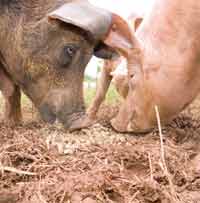Twisted gut risk in pigs during summer

Simple measures preventing twisted guts in pigs this summer should be taken to avoid sudden deaths, according to Duncan Berkshire of Bishopton vet practice. “During summer when temperatures fluctuate and feed intakes can be affected we see an increase in cases, but there are several other factors causing twisted gut,” he says.
The environment, diet and social group status can all lead to twisted gut, but high summer temperatures tend to cause an increase in incidence, mainly later in the grower/finisher stage. “High temperatures can depress feed intakes, but when it cools down pigs may gorge to satisfy their hunger. So ensuring temperatures are consistent can prevent the gut from becoming over full and twisted.”
A twisted gut cuts of the blood supply and leads to a quick death, taking anything from a couple of minutes to a couple for hours. And, normally, once it is twisted there is no treatment to stop it, says Mr Berkshire.
Symptoms are also hard to spot. “Sometimes symptoms of discomfort can be seen, such as colic in a horse and pigs may also show signs of pain. But, because it occurs rapidly, the first sign you would most likely get is a dead carcass, which may appear bloated,” he says.
Another factor that can affect access to food and the flow of food through the gut is social hierarchy. “When there is a lack of trough space or there is a fault with the automatic feeding system, pigs may gorge when feed arrives. Likewise, a pig lower down in the hierarchy may also gorge to minimise the number of negative encounters from pigs higher in the social hierarchy.
“This is why management is essential; making sure pigs are housed in stable, social groups, with adequate feed, water and lying space. Pigs moving a lot can also increase the risk of getting a twisted gut, which is why all the environmental and social factors must be taken in to account.”
But the prevalence of pigs dying from twisted guts could be underestimated, says Mr Berkshire. “Because not every dead pig is sent for a post mortem, the problem won’t always be identified. But, when sudden death occurs, it is worth trying to find the cause so appropriate actions can be taken.”
But, according to BPEX vet advisor Derek Armstrong, the problem of twisted guts is a hit-and-miss condition that occurs randomly. “Some farms could see several cases and often it can be put down to what is being fed. In liquid feeding systems using whey, when too much highly fermentable carbohydrate is being fed, gas will build up, causing instability in the gut.
“Likewise, the same will happen in other diets feeding highly fermentable carbohydrates.” Mr Armstrong recommends using organic acids in feed and water if cases occur.
Feeding high levels of whey and milk products can be particularly risky when it comes to twisted guts, agrees vet Richard Pearson of The George Vet Group. “When whey makes up more than 20% of the diet you are entering dangerous territory,” he says. But, where producers have a lot of whey available to them they may accept 2% mortality as a result of twisted guts. “To minimise the risk of gorging, producers should feed ad lib.”
